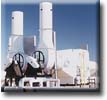 |
 |
 |

Horizontal Crossflow Scrubber guarantees your operating permit level out the stack for HCl, HNO3, HF, H2SO4, Cl2, H2S, NH3, and other contaminants.
The Tri-Mer Crossflow scrubs virtually all inorganic compounds, and maintains stack emissions to specific ppm levels determined by local permit requirements for all input concentrations. Specific outlet requirements based on percent removal can also be guaranteed. View our 8 page Crossflow Scrubber Brochure as an Acrobat pdf file. Key to the performance of this industrial equipment is high-flow liquid recirculation, which produces intense contact between the contaminant and scrubbing liquid. Three industrial system configurations are available. The internal tank/ANSI pump design is manufactured in capacities of 50 cfm through 100,000 cfm. An internal Tank/Vertical pump design is available for 50 cfm through 60,000 cfm applications. An External recirculation System/Dry Sump design is available in single or multiple stage options, with a maximum single unit capacity of 120,000 cfm. The Tri-Mer Ultra-Scrub Crossflow versions operate with zero production down time, because critical system modules have full redundancy. Back-up readiness is assured through regular auto hand-over from primary systems. This feature significantly reduces both monitoring and maintenance requirements, and assures full operation, even during normal maintenance of the equipment. Crossflow industrial scrubbers are supplied with control panels and operator interface. Standard material of construction is UV stabilize polypropylene. PVC and stainless steel are optional materials. Tri-Mer Crossflow scrubbers use Tri-Packs tower packing and high-efficiency industrial mist eliminators. Quench equipped systems can accommodate inlet temperatures to 2000°F. Applications: broad range of industrial manufacturing and process industries. Also, semiconductor, metal finishing, and chemical industries and all facilities generating corrosive fumes and gases. Tri-Mer Crossflow Industrial Scrubbers operate at velocities between 150 and 500 ft./min. The exact operating parameter depends on: VELOCITYVelocity translates into residence time. Residence requirements in the system can vary from 1⁄2 second to several seconds. This variable is specified by Tri-Mer engineering on an individual basis. INLET / OUTLET LOAD FACTORSFor a specific system guarantee regarding removal efficiency, it is necessary to have a definition regarding input vs. output. This number is expressed as mass emission per hour in vs. out. Volumetric expressions, including ppmv, are also appropriate. VOLUMETRIC FLOWThe gas flow through the scrubber system, expressed in cu. ft/min.(cfm), is an important factor in the design of the scrubber vessel. Since residence time in the scrubber is a critical design consideration, the volume of air passing through the scrubber directly affects the cross sectional area. INLET GAS TEMPERATUREMost metal finishing applications operate under 100°F inlet temperature. Tri-Mer Crossflow Systems can accommodate inlet temperatures from ambient to over 2000°F. High temperature systems require a gas quench, integral to the system. GAS STREAM PROFILEUnderstanding the gas stream variables, which include residuals riding in the gas stream in addition to the primary contaminant to be removed, is crucial. Residuals may not be of primary interest from the standpoint of removal efficiency, but could affect system chemistry, or, if particulates are involved, may restrict flow if not accommodated. SYSTEM BLOW-DOWN RATESBlow-down rates are determined by the chemistry involved within that scrubber. Systems requiring low ppb outputs require higher water blow-down capacities than systems operating higher output dynamics. Specific multistage systems may require multiple blow-down points to a final treatment tank. LIQUID-TO-GAS RATIONThis ratio is determined by the items discussed earlier. System removal requirements play an important role. Tri-Mer engineering will be responsible for calculations. |
 |
